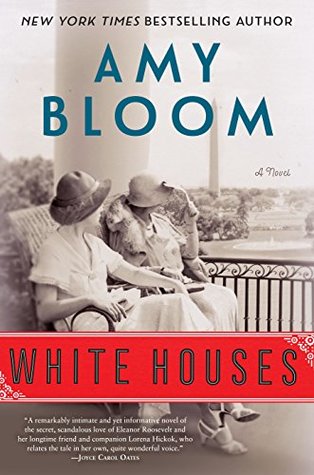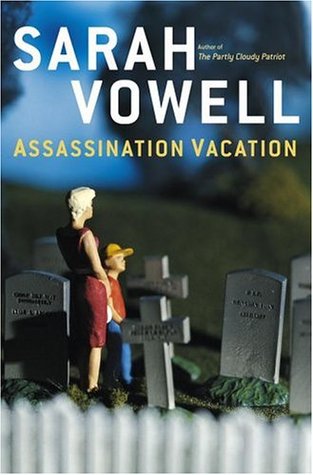Tag Archives: U.S. history
A President’s Day Reading Special
Today is President’s Day in the States, which was instituted to jointly celebrate the February birthdays of George Washington and Abraham Lincoln and is more about feting historical presidents than the current one (thank goodness). I’ve recently read four books that shed light on some American presidents: a brand-new novel, two memoirs, and a zany travel book.

White Houses by Amy Bloom (2018)
 April 1945: Franklin D. Roosevelt is dead. His widow Eleanor goes to New York City to spend a long weekend with her lover, former White House reporter Lorena Hickok. Lorena, our feisty narrator, recalls her abusive upbringing in South Dakota, her early days as a reporter, and the flirtation that arose when she interviewed Eleanor about her governor husband’s presidential campaign. The open secret of FDR’s affair with his secretary, Missy LeHand, is contrasted with Eleanor and Lorena’s relationship – and with the situation of Eleanor’s cousin Parker Fiske, a closeted homosexual. Lorena’s voice is enjoyable, but I felt I gained no particular insight into Eleanor or Franklin Roosevelt. Bloom aims to reconcile Eleanor’s frumpy image with her passionate secret self, but for me that never fully happened. The most interesting scenes are from Lorena’s time working for a circus freak show on her way to Chicago (presumably completely made up). While Bloom had access to letters that passed between Lorena and Eleanor, she emphasizes that this is a work of fiction.
April 1945: Franklin D. Roosevelt is dead. His widow Eleanor goes to New York City to spend a long weekend with her lover, former White House reporter Lorena Hickok. Lorena, our feisty narrator, recalls her abusive upbringing in South Dakota, her early days as a reporter, and the flirtation that arose when she interviewed Eleanor about her governor husband’s presidential campaign. The open secret of FDR’s affair with his secretary, Missy LeHand, is contrasted with Eleanor and Lorena’s relationship – and with the situation of Eleanor’s cousin Parker Fiske, a closeted homosexual. Lorena’s voice is enjoyable, but I felt I gained no particular insight into Eleanor or Franklin Roosevelt. Bloom aims to reconcile Eleanor’s frumpy image with her passionate secret self, but for me that never fully happened. The most interesting scenes are from Lorena’s time working for a circus freak show on her way to Chicago (presumably completely made up). While Bloom had access to letters that passed between Lorena and Eleanor, she emphasizes that this is a work of fiction.
My rating: 
[Neat little connection: As First Lady, Hillary Clinton felt a kinship with Eleanor Roosevelt, and visited her portrait in the Oval Office to have imaginary chats and buck up her courage. These are described in a chapter of Living History entitled “Conversations with Eleanor.”]
Living History: Memoirs by Hillary Rodham Clinton (2003)
 I may be showing my political colors with this choice. However, in my defense, I have also read memoirs by Laura Bush and Sarah Palin, both of which, like this, are rumored to have been ghostwritten. (In her acknowledgments Clinton mentions Lissa Muscatine as “Responsible for many of the words in my speeches as First Lady and in this book”.) The first few chapters, about Clinton’s early years and college days, are rather plodding, but once she meets Bill at Yale Law School in 1971 things pick up, and I found the whole informative and diverting. I hadn’t realized that Clinton was an accomplished lawyer in her own right, focusing on women’s and children’s rights and family law. She was also a researcher on the Nixon impeachment case – an experience that, ironically, came in handy three decades later.
I may be showing my political colors with this choice. However, in my defense, I have also read memoirs by Laura Bush and Sarah Palin, both of which, like this, are rumored to have been ghostwritten. (In her acknowledgments Clinton mentions Lissa Muscatine as “Responsible for many of the words in my speeches as First Lady and in this book”.) The first few chapters, about Clinton’s early years and college days, are rather plodding, but once she meets Bill at Yale Law School in 1971 things pick up, and I found the whole informative and diverting. I hadn’t realized that Clinton was an accomplished lawyer in her own right, focusing on women’s and children’s rights and family law. She was also a researcher on the Nixon impeachment case – an experience that, ironically, came in handy three decades later.
Clinton is honest and self-deprecating about her image issues. She was a whole new breed of First Lady, chairing the committee for Bill’s health care bill and making state visits. Her Beijing speech is still a touchstone for international feminism. Inevitably, a good chunk of the book is devoted to the investigations that plagued the Clinton administration. The eight years of Bill’s presidency are very much the focus; the book ends with them saying a final farewell to the White House. By this point, though, Clinton had been elected a New York senator, so she left for a new mission. I picked up a secondhand copy of Hard Choices the other week and look forward to learning more about her time as a senator and then Secretary of State.
My rating: 
[Neat little connection: Roland Mesnier and his sweet creations get two mentions in Living History: the giant carrot cake he made for Chelsea’s sixteenth birthday; and the book-shaped cake for her graduation.]
All the Presidents’ Pastries: Twenty-Five Years in the White House, A Memoir by Roland Mesnier with Christian Malard [trans. from French by Louise Rogers Lalaurie] (2007)
 Roland Mesnier was the White House pastry chef for 25 years. After training in France and Germany, he worked at the Savoy in London and then as head pastry chef at the Princess Hotel, Bermuda – all by age 20. His specialty was intricate sugar sculptures, for which he won international competitions. He also worked in Paris and Virginia before hearing that Rosalynn Carter was looking for a White House pastry chef. Fast-tracked to U.S. citizenship, he made elaborate desserts for presidential family occasions and state dinners. The latter were always based on research into a particular country’s culture, products, taste and traditions. These impressive constructions included molded sorbets, petits fours and marzipan figures, and were often feats of logistics and timing. The memoir is undoubtedly more interesting for what it tells about the First Families (Nancy Reagan was a hard taskmistress; Barbara Bush was his personal #1) than for its author’s life. An appendix includes 15 fairly simple (i.e., replicable at home!) recipes from his 2004 cookbook Dessert University, such as pecan bourbon pie and baked apple soufflé.
Roland Mesnier was the White House pastry chef for 25 years. After training in France and Germany, he worked at the Savoy in London and then as head pastry chef at the Princess Hotel, Bermuda – all by age 20. His specialty was intricate sugar sculptures, for which he won international competitions. He also worked in Paris and Virginia before hearing that Rosalynn Carter was looking for a White House pastry chef. Fast-tracked to U.S. citizenship, he made elaborate desserts for presidential family occasions and state dinners. The latter were always based on research into a particular country’s culture, products, taste and traditions. These impressive constructions included molded sorbets, petits fours and marzipan figures, and were often feats of logistics and timing. The memoir is undoubtedly more interesting for what it tells about the First Families (Nancy Reagan was a hard taskmistress; Barbara Bush was his personal #1) than for its author’s life. An appendix includes 15 fairly simple (i.e., replicable at home!) recipes from his 2004 cookbook Dessert University, such as pecan bourbon pie and baked apple soufflé.
 (I must also marvel at the journey that this particular book has been on. It is signed by the English translator and inscribed to her mother: “Mum, with all love, Louise – 8 May 2007”. This hardback copy somehow made it all the way to the £1 bargain shelves outside the upper level of the castle in Hay-on-Wye, Wales, where my husband snatched it up last spring.)
(I must also marvel at the journey that this particular book has been on. It is signed by the English translator and inscribed to her mother: “Mum, with all love, Louise – 8 May 2007”. This hardback copy somehow made it all the way to the £1 bargain shelves outside the upper level of the castle in Hay-on-Wye, Wales, where my husband snatched it up last spring.)
My rating: 
Assassination Vacation by Sarah Vowell (2005)
 U.S. history has never been so much fun! There’s nothing Sarah Vowell loves more than a presidential plaque, monument, home or grave, and her enthusiasm is infectious. Over half of this book is about Abraham Lincoln’s assassination; the rest goes to those of James Garfield and William McKinley (attempts on T. Roosevelt and Reagan get a brief mention, but she pretty much avoids JFK – presumably because that would fill a book of its own). If all you remember about these last two assassins is that one was a disgruntled civil servant and the other was an anarchist with a funny name, let Vowell enlighten you with her mixture of travel and trivia. She follows John Wilkes Booth’s escape route from the nation’s capital, traces Charles Guiteau back to upstate New York’s Oneida community, and sympathizes with Leon Czolgosz’s hard early life. The book came out in 2005, and what with Vowell’s outrage over the Dubya administration, it does feel a little dated. But if the rest of her books are this nerdy-cool, I’ll be reading them all.
U.S. history has never been so much fun! There’s nothing Sarah Vowell loves more than a presidential plaque, monument, home or grave, and her enthusiasm is infectious. Over half of this book is about Abraham Lincoln’s assassination; the rest goes to those of James Garfield and William McKinley (attempts on T. Roosevelt and Reagan get a brief mention, but she pretty much avoids JFK – presumably because that would fill a book of its own). If all you remember about these last two assassins is that one was a disgruntled civil servant and the other was an anarchist with a funny name, let Vowell enlighten you with her mixture of travel and trivia. She follows John Wilkes Booth’s escape route from the nation’s capital, traces Charles Guiteau back to upstate New York’s Oneida community, and sympathizes with Leon Czolgosz’s hard early life. The book came out in 2005, and what with Vowell’s outrage over the Dubya administration, it does feel a little dated. But if the rest of her books are this nerdy-cool, I’ll be reading them all.
My rating: 